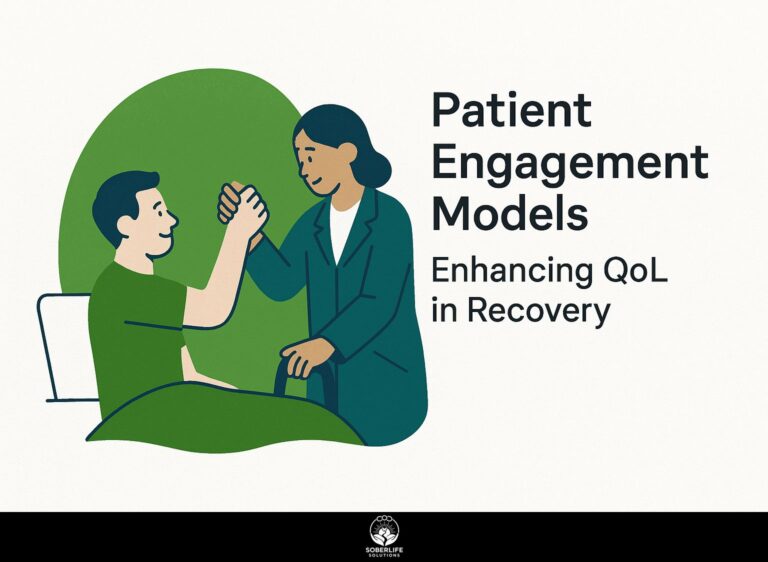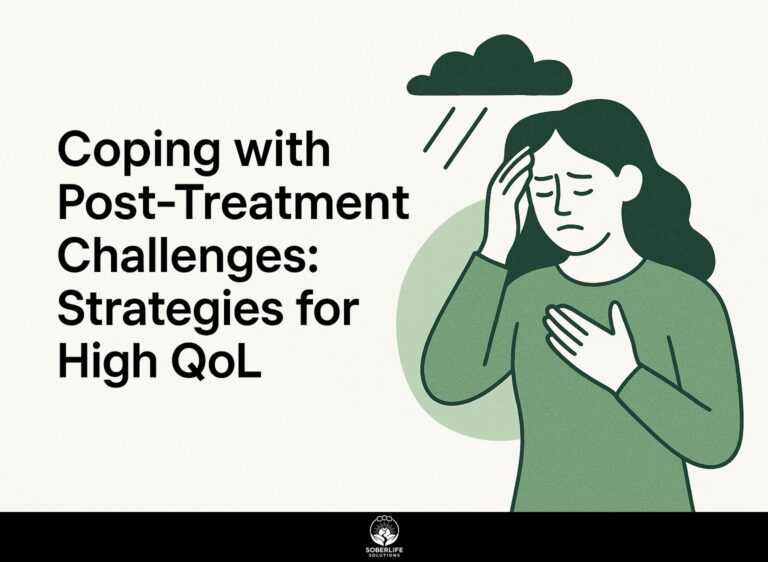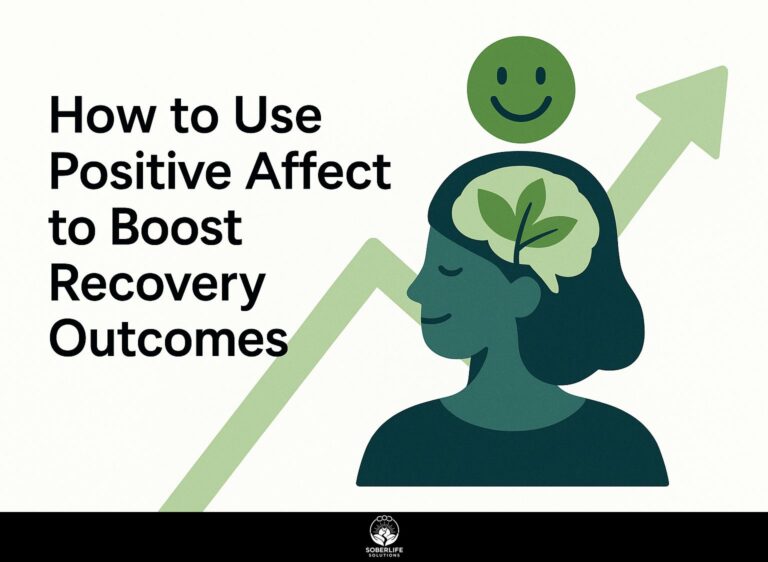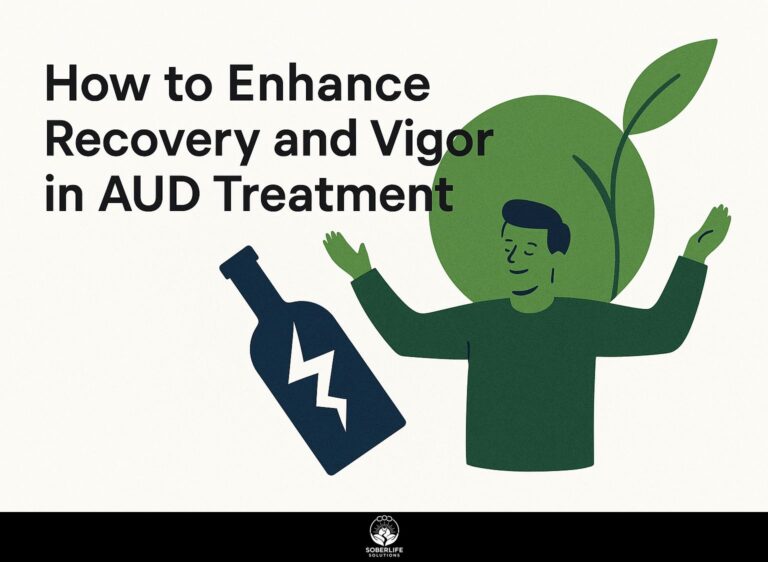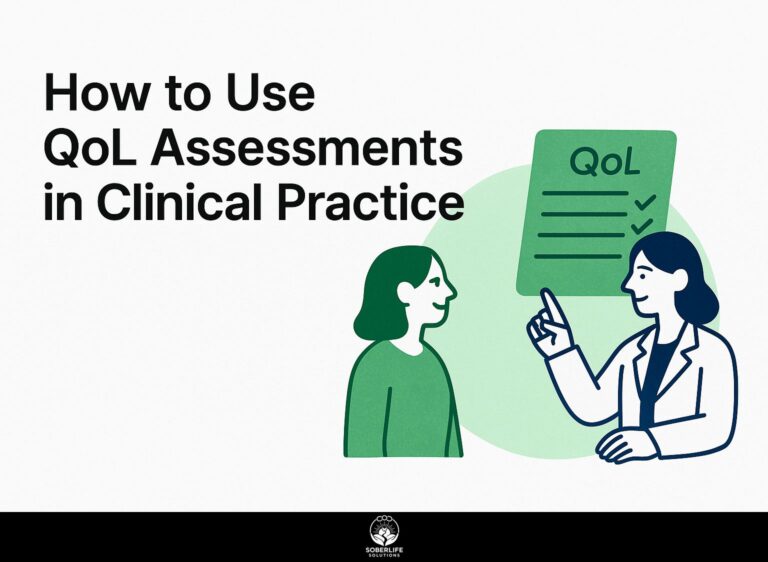Improving Sleep and QoL in AUD Patients with Disorders
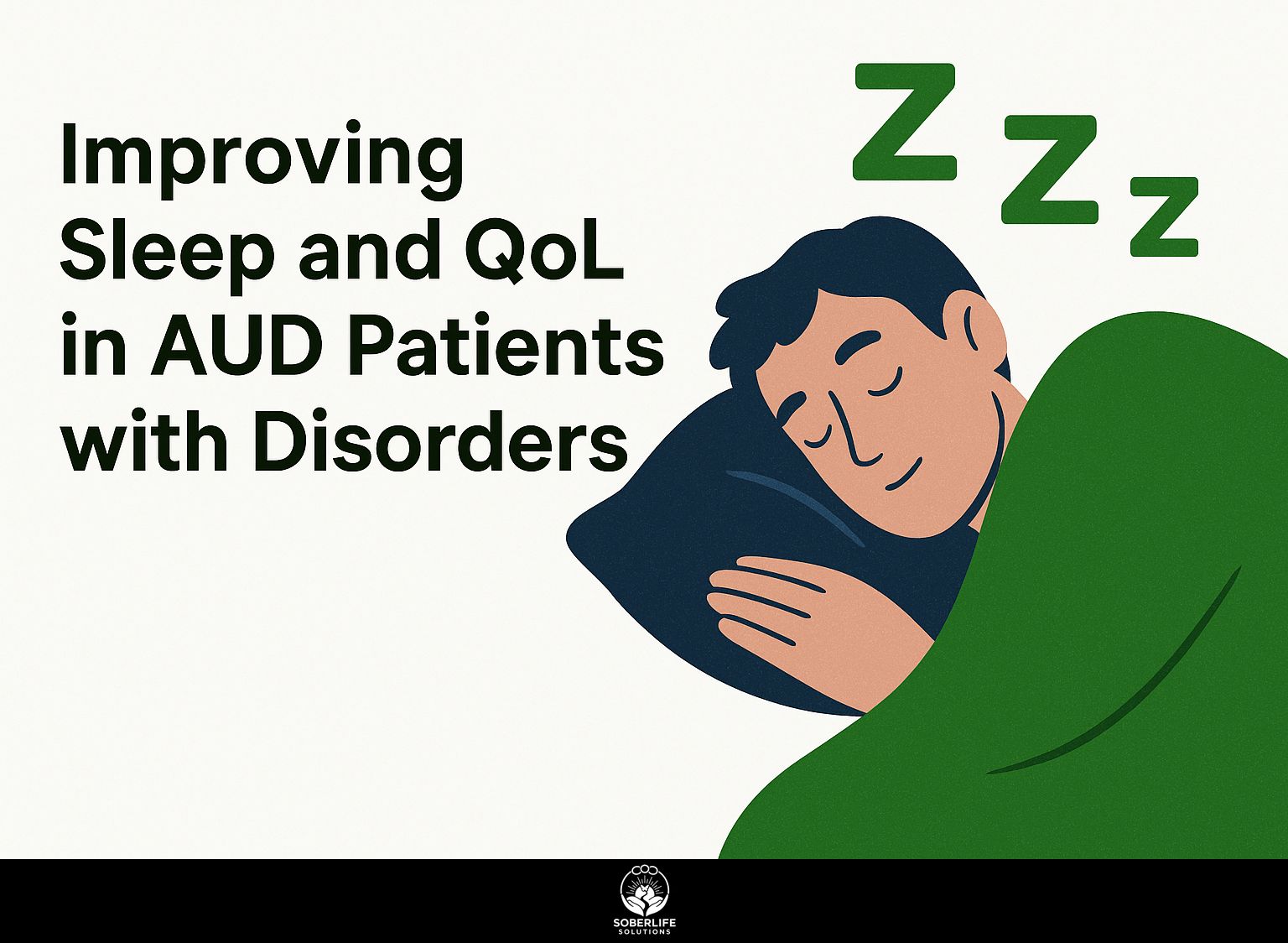
Struggling with insomnia can be particularly challenging for individuals battling alcohol use disorder (AUD). The interplay between substance use and sleep disturbances often exacerbates symptoms of this disorder, significantly impacting quality of life (QoL). This article discusses effective ways to improve sleep for AUD patients, such as cognitive behavioral therapy and whole-person treatments, to help their overall wellness. Learn how fixing sleep problems can contribute to a more complete recovery process.
Key Takeaways:
Definition and Prevalence
AUD is characterized by an inability to control alcohol use, with National Institute on Alcohol Abuse and Alcoholism reporting that 1 in 8 adults suffers from this disorder.
This disorder can affect individuals from various demographics, including younger adults, women, and people from diverse backgrounds.
It’s important to raise awareness. Use screening tools like the AUDIT (Alcohol Use Disorders Identification Test) to check for risk. According to UpToDate, a respected medical resource, the AUDIT questionnaire is a standardized tool used globally to identify at-risk individuals.
Early interventions, like motivational interviewing or cognitive-behavioral therapy, can significantly improve outcomes. If you’re considering motivational interviewing as a strategy, learning how it specifically benefits veterans with AUD could be insightful, as discussed in this article on motivational interviewing for AUD.
Local groups and websites like SMART Recovery offer additional support for recovery.
By following these practical steps, people and families can more effectively deal with the issue of AUD.
Impact on Quality of Life (QoL)
Individuals with AUD often experience a decreased quality of life, with studies indicating a 40% reduction in life satisfaction due to social and health issues. This decline in life satisfaction is further explored in a comprehensive study available on Frontiers in Psychiatry, which delves into the correlation between mental health problems and life satisfaction among individuals.
These struggles manifest in various aspects of life. For instance, relationships can suffer; a survey by the National Institute on Alcohol Abuse and Alcoholism found that 60% of individuals with AUD reported conflicts with family and friends.
Employment is affected, as about one-third of people with AUD noted they faced challenges maintaining stable jobs. Mental health conditions, such as depression and anxiety, also significantly increase among those with AUD, compounding the overall decline in life satisfaction.
Dealing with these complex problems is important for healing.
The Relationship Between AUD and Sleep Disorders
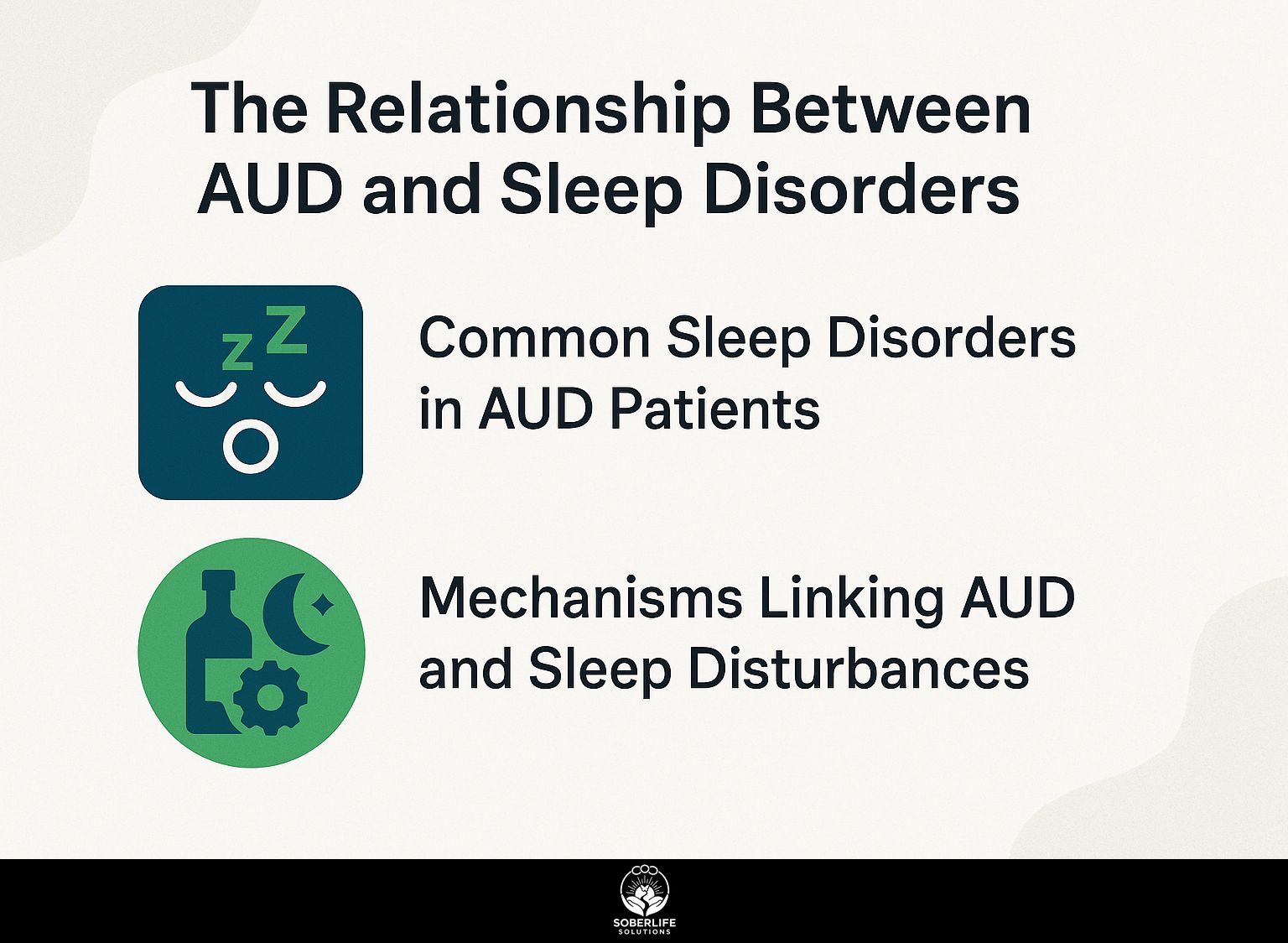
There is a strong connection between Alcohol Use Disorder (AUD) and sleep problems. As many as 80% of individuals with AUD have trouble sleeping and face sleep disturbances. Understanding how to address associated anxiety and wellbeing is crucial for recovery. Learn more about strategies to enhance wellbeing during AUD recovery.
Common Sleep Disorders in AUD Patients
Insomnia, sleep apnea, and restless leg syndrome are among the most prevalent sleep disorders experienced by AUD patients, contributing to daytime dysfunction.
These disorders disturb sleep and increase symptoms of Alcohol Use Disorder (AUD). Around 30% of people with AUD experience sleep problems, which cause tiredness and irritability and make getting better harder.
Sleep apnea, prevalent in about 20% of AUD individuals, can cause significant daytime drowsiness, hindering cognitive function and impulse control. Restless leg syndrome, impacting around 15% of this population, creates uncomfortable sensations that can prevent sufficient rest.
Addressing these sleep issues through behavioral interventions or medication can significantly improve overall treatment outcomes and quality of life.
Mechanisms Linking AUD and Sleep Disturbances
Changes in natural sleep patterns and the impact of mind-altering drugs during withdrawal play a major role in sleep problems for people with Alcohol Use Disorder (AUD).
These sleep issues stem from alterations in the sleep-wake cycle, often intensified during withdrawal periods. Research indicates that individuals with Alcohol Use Disorder (AUD) experience a shift in their circadian clocks, which may lead to insomnia or fragmented sleep. A study published in ScienceDirect highlights that alterations in circadian rhythms following alcohol use can significantly affect sleep patterns.
For instance, a study from the Journal of Clinical Sleep Medicine found that AUD patients were more likely to report difficulty falling asleep and remaining asleep.
Cognitive-behavioral interventions and mindfulness practices can be effective in addressing these disturbances, helping to stabilize sleep patterns by gradually retraining the body’s natural rhythms. Additionally, [improving sleep patterns through holistic approaches](https://soberlifesolutions.com/improving-sleep-holistic-recovery/) can complement these methods, providing a comprehensive strategy for recovery.
Assessing Sleep Quality in AUD Patients
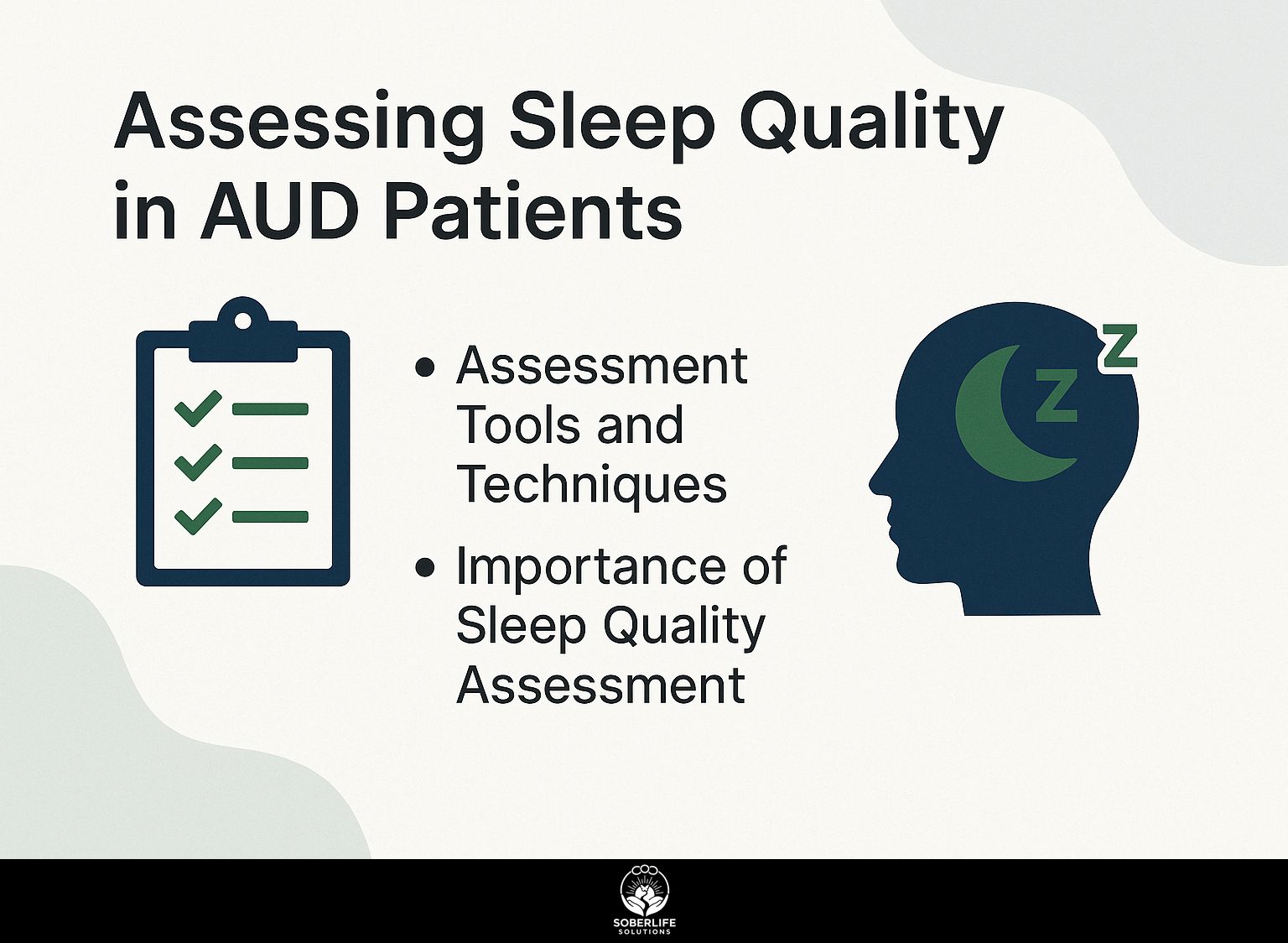
Assessing a person’s sleep quality is necessary for developing effective treatments for AUD patients, and there are reliable tools available for doctors to use.
Assessment Tools and Techniques
Common assessment tools for sleep quality include the Pittsburgh Sleep Quality Index (PSQI) and actigraphy, which provide objective data on sleep patterns.
In clinical practice, these tools help clinicians collect detailed information about patients’ sleep habits. For instance, the PSQI, a self-report questionnaire, evaluates sleep quality over the past month, addressing components such as sleep duration and disturbances.
Meanwhile, actigraphy means using a wrist device that tracks movement to study sleep and wake patterns over several days. Using these methods together can often help find sleep problems more easily, leading to specific treatments like cognitive behavioral therapy or certain medication changes for people with AUD.
Importance of Sleep Quality Assessment
Assessing sleep quality can improve treatment results for AUD patients. Research shows that customized sleep treatments increase overall recovery rates by 30%.
Interventions such as cognitive behavioral therapy for insomnia (CBT-I) and sleep hygiene practices can be particularly effective. Research indicates that implementing CBT-I can lead to significant reductions in both sleep disturbances and alcohol cravings.
Promoting habits such as sticking to regular sleep times, improving the bedroom setting, and reducing caffeine consumption in the afternoon can improve sleep quality.
By addressing these factors, healthcare providers can create a complete approach that targets AUD and improves mental health and overall well-being.
Interventions for Improving Sleep in AUD Patients
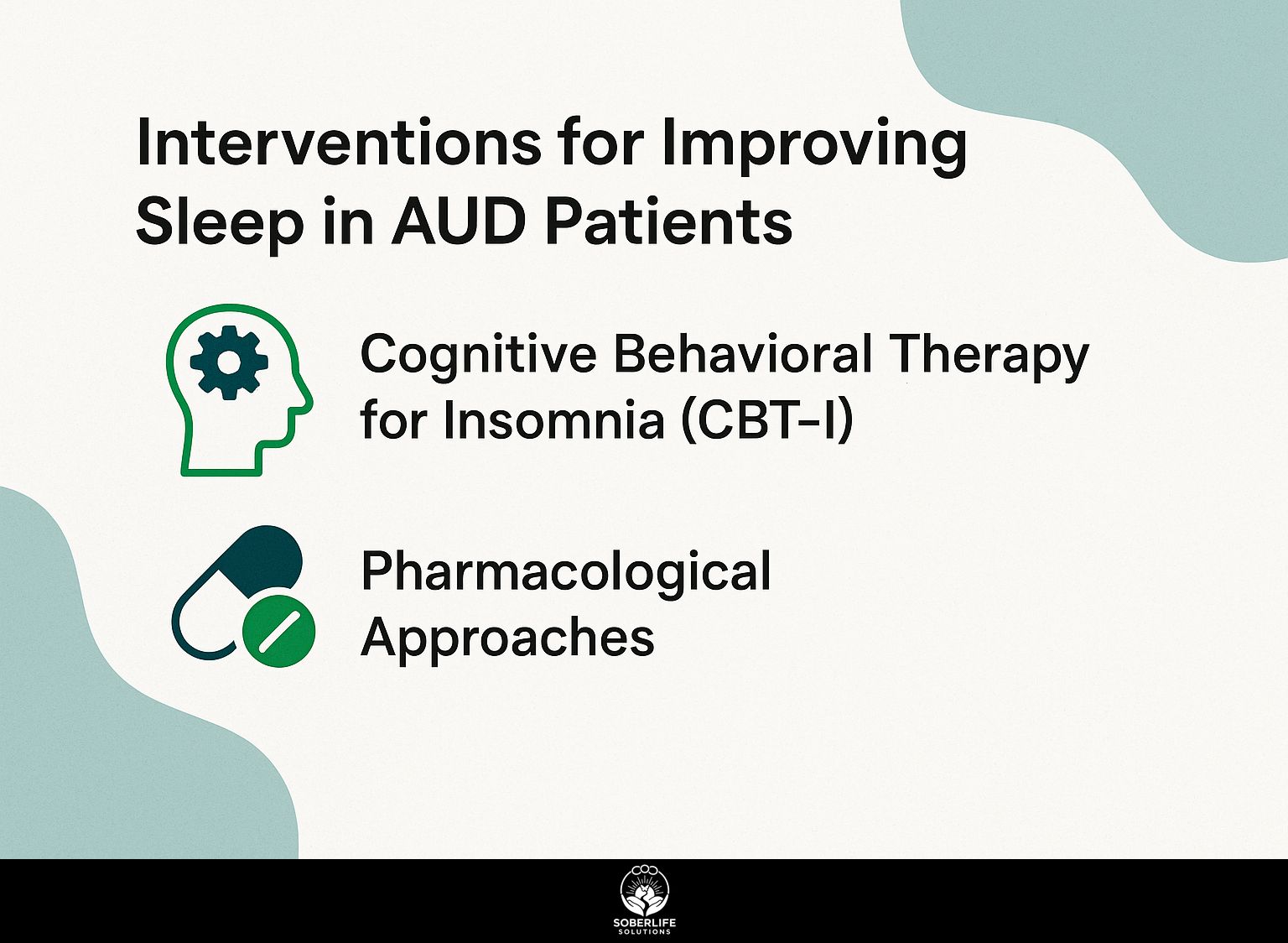
Using Cognitive Behavioral Therapy for Insomnia (CBT-I) with medication can significantly improve sleep quality in patients with Alcohol Use Disorder (AUD). Worth exploring: Improving Sleep Patterns: Holistic Approaches in Recovery, which offers additional strategies for enhancing sleep during recovery.
Cognitive Behavioral Therapy for Insomnia (CBT-I)
CBT-I has shown a 60% improvement rate in sleep onset and continuity among AUD patients in clinical studies over the past decade.
Cognitive Behavioral Therapy for Insomnia (CBT-I) combines education and structured interventions to target sleep issues among AUD patients.
Key components include:
- Sleep restriction
- Stimulus control
- Cognitive restructuring
For instance, patients learn to limit their time in bed to improve sleep quality, while techniques like keeping a sleep diary help identify patterns. Real-life applications indicate that after 8-10 sessions, many AUD patients report reduced insomnia symptoms and improved overall well-being.
CBT-I addresses addiction and sleep together, helping people recover more effectively.
Pharmacological Approaches
Pharmacotherapy for sleep disorders in AUD patients often includes agents like trazodone and melatonin, showing varying degrees of effectiveness.
Trazodone, an antidepressant commonly prescribed for insomnia, improves sleep quality but may cause sedation the next day, particularly in sensitive individuals.
Research in the Journal of Clinical Psychopharmacology showed that using it might improve sleep patterns in people with Alcohol Use Disorder.
Unlike other options, melatonin, a natural hormone, usually doesn’t make you sleepy the next day, but it might not work well for very bad insomnia.
While both options demonstrate benefits, clinicians should consider patient history, potential side effects, and ongoing alcohol use to tailor therapy appropriately.
Holistic Approaches to Enhance QoL
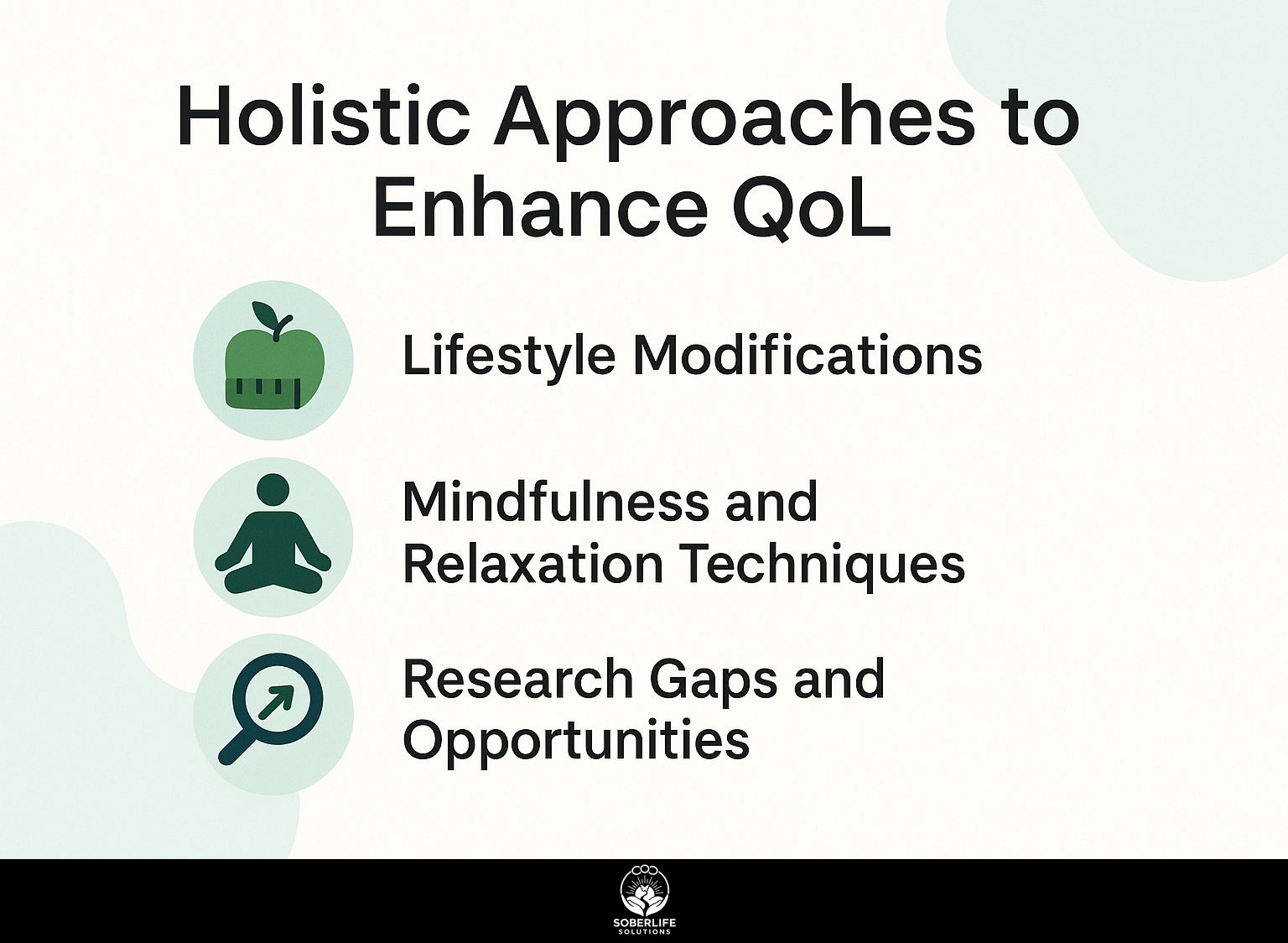
Using complete methods such as changing daily habits and practicing mindfulness can greatly improve the life of patients with AUD. If interested, exploring the principles and benefits of holistic therapy can provide deeper insights into how these approaches contribute to rehabilitation and overall well-being.
Lifestyle Modifications
Including regular exercise, a balanced diet, and better sleep habits can improve overall health by 25% for AUD patients.
To effectively implement these lifestyle modifications, begin by aiming for at least 150 minutes of moderate exercise weekly, such as brisk walking or cycling.
Pair this with a diet rich in whole foods-prioritize fruits, vegetables, lean proteins, and whole grains while reducing sugar and processed foods.
For sleep hygiene, establish a consistent bedtime routine; examples include limiting screen time before bed, creating a dark sleeping environment, and practicing relaxation techniques like deep breathing or meditation.
Research shows that these changes can dramatically improve well-being and recovery outcomes.
Mindfulness and Relaxation Techniques
Practices such as mindfulness meditation and progressive muscle relaxation have been shown to reduce stress and improve sleep quality in AUD patients by 40%.
To implement mindfulness meditation, set aside 10-15 minutes daily in a quiet space. Pay attention to your breath, and calmly bring your mind back if it gets distracted.
For progressive muscle relaxation, lie down and tense each muscle group for five seconds before releasing, starting from your toes and moving up to your head.
Both methods can be supplemented with apps like Headspace or Calm, which provide guided sessions. Regular practice helps to develop awareness and brings calm, which is important for recovery in AUD patients.
Research Gaps and Opportunities
Identifying and addressing current research gaps, such as the impact of specific withdrawal symptoms on sleep, will be essential for advancing treatment approaches for AUD.
One critical area for further investigation is how different withdrawal symptoms, like anxiety and tremors, specifically affect sleep quality in AUD patients.
Using wearable sleep trackers, like the Oura Ring or Fitbit, can give useful real-time information. Researchers could look into cognitive behavioral therapy (CBT) customized to deal with these sleep problems.
Examining the role of pharmacological interventions, like melatonin or gabapentin, may reveal novel treatment pathways. Concentrating research on these topics could significantly improve recovery results and benefit patients’ health.
Frequently Asked Questions
What is the relationship between AUD and sleep disorders?
Alcohol use disorder (AUD) has been linked to various sleep disorders, including insomnia, sleep apnea, and circadian rhythm disorders. These sleep disturbances can significantly impact the quality of life of individuals with AUD and may also contribute to their alcohol use.
How can improving sleep quality benefit AUD patients?
Improving sleep in people with AUD can lead to several benefits, such as better physical and mental health, clearer thinking, reduced risk of alcohol relapse, and overall better quality of life. Getting enough sleep is important for healing from AUD and can also help fix root problems that might have led to the disorder.
What are some strategies for improving sleep in AUD patients?
To help AUD patients sleep better, try to stick to a regular sleep pattern, make the bedroom comfortable, steer clear of caffeine and nicotine, use relaxation methods, and get help for any sleep issues.
How can healthcare professionals help improve sleep and quality of life in AUD patients?
Healthcare professionals can significantly help AUD patients by focusing on both the AUD and any related sleep disorders to improve sleep and quality of life. They can also provide education and support for healthy sleep habits and offer specialized treatments, such as cognitive-behavioral therapy for insomnia.
Is there a connection between sleep and relapse in AUD patients?
Yes, bad sleep and interruptions in sleep patterns have been connected to a higher risk of relapse in patients with Alcohol Use Disorder (AUD). Not getting enough sleep can affect your ability to make decisions and make you desire things more, which can make staying sober harder. Fixing sleep problems is important for ongoing recovery from AUD.
Can improving sleep also improve the quality of life in AUD patients?
Yes, improving sleep can positively impact the quality of life in AUD patients. Adequate sleep is essential for physical and mental health, and better sleep quality can lead to improved mood, increased energy, and better overall functioning. It can also help individuals better cope with the challenges of recovery from AUD.


